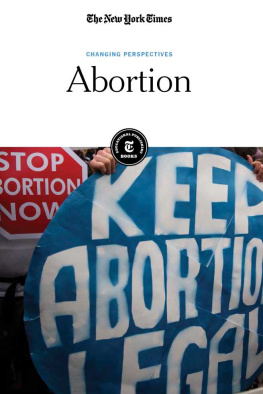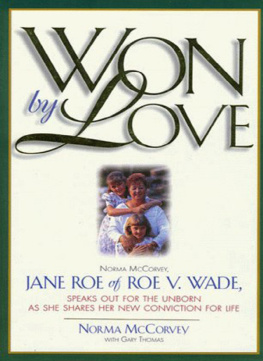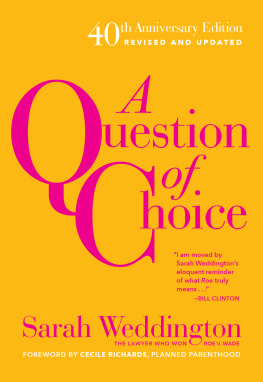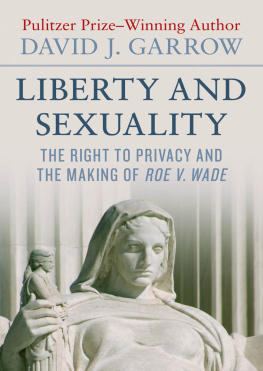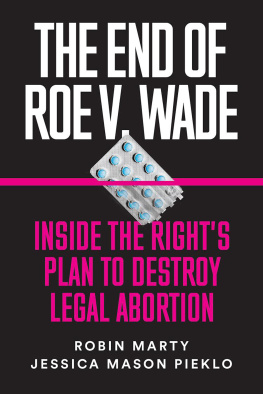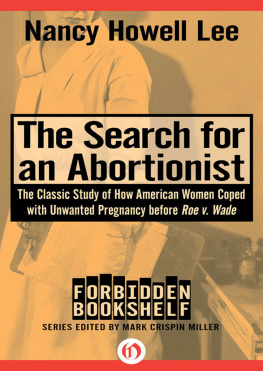ABOUT ABORTION
About the In all Things Charity Series
JOHN WESLEY IS often credited with the saying, In essentials unity. In non-essentials liberty. In all things charity.
As the world becomes more religiously pluralistic and societies and cultures grow more contentious and divided it will behoove the church to gain clarity in its discernment of the distinction between essentials and non-essentials. We must not shrink back from boldly articulating the core truths of the Christian faith. At the same time, we must grow in the quality of our character as our very conversations witness to the gospel in the presence of a watching world. Said simply, our relationships within the church are the barometer of our witness to the world.
Jesus minced no words when he told his disciples that the authenticity of their association with him would be known only by the quality of their love for one another. Later in prayer he would connect the loving unity of the church to the believability of the gospel. See John 17.
The Apostle Paul, in the celebrated thirteenth chapter of his first letter to the Corinthian Church, in essence tells us the absence of charity, or love, signals failure.
As a publisher, Seedbed does not want to steer clear of the difficult subjects of our time. Nor do we want to agitate the church with unnecessary controversy. For this reason, Seedbed created the, In All Things Charity series. The series will contain books across a range of challenging issues. For the series we are selecting authors whom we believe embody the variety of character which enables them to demonstrate confidence in their point of view with truthful love in their approach.
IN ALL THINGS CHARITY / A SERIES
ABOUT ABORTION
10 THINGS A NEW GENERATION OF CHRISTIANS SHOULD KNOW
JAMES V. HEIDINGER II

Copyright 2014 by James V. Heidinger II
All rights reserved. No part of this publication may be reproduced,
stored in a retrieval system, or transmitted, in any form or
by any meanselectronic, mechanical, photocopying, recording,
or otherwisewithout prior written permission, except for brief
quotations in critical reviews or articles.
Scripture quotations are taken from HOLY BIBLE, NEW
INTERNATIONAL VERSION. Copyright 1973, 1978, 1984
by International Bible Society. Used by permission of Zondervan.
All rights reserved.
Printed in the United States of America
Paperback ISBN: 978-1-62824-054-2
Mobi ISBN: 978-1-62824-055-9
ePub ISBN: 978-1-62824-056-6
uPDF ISBN: 978-1-62824-057-3
Library of Congress Control Number: 2013957551
Cover design by Andrew Dragos Page design by
PerfecType, Nashville, Tennessee
SEEDBED PUBLISHING
Sowing for a Great Awakening
204 N. Lexington Avenue, Wilmore, Kentucky 40390
www.seedbed.com
With appreciation to the Rev. Paul T. Stallsworth,
editor of Lifewatch newsletter and a faithful
advocate for, and defender of, life within
The United Methodist Church and beyond.
Contents
Introduction
SEVERAL YEARS AGO, I became convinced of the need for this new generation of Christians to fully understand the substance of the case that can be made for life in the ongoing controversy about abortion. In these days, when we are being urged to rethink church, it also would be well for us to rethink abortion. The timing to do so is right.
In January 2013, we marked the fortieth anniversary of the sweeping Roe v. Wade Supreme Court decision, which gave women an unprecedented constitutional right for legalized abortion in America. Since that decision, an estimated 55 million abortions have been performed in the United States. The Guttmacher Institute, Planned Parenthoods research arm, claims that 43 percent of women of childbearing age in America have experienced at least one abortion. This staggering statistic tells us that there are literally millions of women in America who are living with the guilt, hurt, and heartache of having experienced an abortion.
Adding to the timeliness to rethink abortion, is the recent Time magazine cover story that noted the fortieth anniversary of Roe, saying, [Forty years ago,] abortion-rights activists won an epic victory with Roe v. Wade. Underneath the title it reads, Theyve been losing ever since. According to the Time article, abortion-rights supporters are losing because it is getting more difficult to find clinics to do the procedures.
A 2010 Gallup Poll revealed that 47 percent of Americans say they are pro-life on abortion versus 45 percent who say they are pro-choice. An encouraging part of the poll was that 47 percent of eighteen- to twenty-nine-year-olds said they are pro-life, which is an increase of five percent from the 2008 Gallup numbers. If there is a growing resistance to Americas culture of easy-access abortion on demand, we need to understand why that is happening.
Why rethink abortion? Because we have a generation of Christians who have known nothing except the culture of easy and legal abortion, brought about by the Roe v. Wade court decision. Many in this new generation, according to the Gallup Poll numbers, seem to have pro-life instincts. They may know of the political debate they see in the media, but may not be aware that it has not always been this way in America. They may be unaware that the arguments and rationales used in the 70s and 80s in support of unrestricted abortion were (and remain today) substantively weak, not carefully reasoned, and sometimes based on misleading, even dishonest claims. They may not know that the Supreme Courts decision was and continues to be sharply criticized by respected ethicists, legal scholars, and Christian theologians. Knowing these things may help inform todays generation and give substantive support to its pro-life instincts.
I have found myself reflecting on what this new generation of Christians needs to know about the controversya generation which has only known forty years of Roes abortion culture. I have thought much about what I would try to say to my precious grandchildrenmy eight- and seven-year-old granddaughters and three-year-old grandsonas they grow toward adolescence and maturity.
As I address this generation of Christians in America about abortion, I want to rightly handle the word of truth. The apostle Paul charged Timothy to be a workman who does not need to be ashamed and who correctly handles the word of truth (2 Tim. 2:15). He also urged Timothy to keep what he had heard from Paul as the pattern of sound teaching (2 Tim. 1:13).
It may sound strange to speak about the word of truth, but the church has always spoken about truth. Paul also referred to it as the pattern of sound teaching. This sound teaching included, of course, the churchs teaching about life, family, marriage, and children.
As we reflect upon the fortieth anniversary of the Roe v. Wade Supreme Court decision, I fear that neither the church nor American society has done well in following the pattern of sound teaching. We have not listened to what the church has taught historically concerning the sanctity of life; we have not considered carefully the teaching of the church fathers of the first five centuries; we have not listened carefully to the pattern of sound teaching of our greatest theologians and ethicists of the last century.
So, as I write, I hope to correctly handle the word of truth about abortion. I want to do it prayerfully and with sensitivity, knowing that there are those who will read this who may have had an abortion. Some may have struggled in desperation about the decision to have an abortion. Others may have had a family member or friend who has had an abortion. Some may yet struggle with that decision in the future.
Next page


